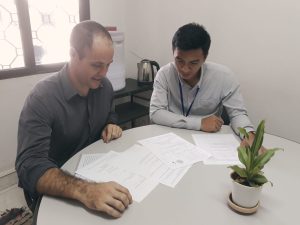Discipling requires humility
CMS missionaries Craig and Samantha (Sam) McCorkindale serve in Cambodia, where Craig lectures in theology at Phnom Penh Bible College. Here he speaks of a lesson he learned about the importance of humility in teaching.
Teaching online during the pandemic has been tough. At times I have felt that my ability to disciple has been hindered. Teachers don’t have the same access to students as during normal face to face class times. I couldn’t easily meet up with one or some of them to discuss a particular issue or topic. What follows is a lesson God taught me on discipleship in the context of teaching in this season.
I had been teaching a systematic theology class on the Holy Spirit, using Zoom to communicate online. I was frustrated that online I was only able to get through a third of the content that we could get through in person. I was exhausted because in online teaching you give, but you don’t ‘get back’ (with questions and interactions) in the same way that you do when students are physically present in the classroom. But largely, I was doubting the usefulness of what I was doing. These doubts weren’t winning in the long term, but they were present.

Craig with one of the students from Phnom Penh Bible School.
The importance of revealing limitations
At the end of class one day, I logged onto Zoom with my translator to debrief the lesson. Sometimes there is not much feedback from the day, or I am already aware of the feedback that he offers to me. But plenty of times I learn a great deal from his thoughts. This was one of those days.
After talking about a few things, he offered an observation. He said that he really appreciated the way I answered questions. That is, I didn’t scold the questioner if I didn’t know the answer. He then noted that I answered honestly, “I don’t know,” when I was unsure of how to respond. And not only that but he appreciated the way I thought about a question that was asked the week before and then followed up with some further thoughts.
“In a culture where the teacher is always right, admitting I didn’t have the answers or that I was wrong was powerful.”
It is common in Khmer culture to save face. For teachers, this means that if they don’t know the answer to a question, they will sometimes blame the questioner or make up an answer. My translator’s feedback was a wonderful encouragement during a hard season. I had been focused on content and lamenting my seeming lack of connection with the students. Yet God was at work through me in my weakness.
Admitting I didn’t have all the answers, responding gently when students exposed my flaws through their questions, and showing care by following up on their concerns later was having a significant impact. The lesson for me—which I needed to be reminded of again—is that teaching content is important, but so is character. They go together. In a culture where the teacher is always right, admitting I didn’t have the answers, or that I was wrong, was powerful.
Conduct and character matter
In classroom settings it can be easy to focus on content. It’s also easy to feel disconnected from students. In a culture where the status of ‘teacher’ is highly elevated, how do I walk alongside my students in discipleship? God’s lesson to me this day was that my conduct and my character were key parts of discipleship. I needed to remember that this is a fundamental way that can God use me to disciple my students as their teacher.
My hope is that this model of ‘walking alongside’ might be carried on by the students I teach. I pray that they go on to answer questions graciously and honestly, to build up Cambodian Christians whom they are sent out to serve. As I seek to be humble and honest about my limitations, God can work through my weaknesses to grow others as Christ’s disciples. May this be an encouragement to you as you seek to disciple those whom God has so graciously placed around you in your context.
PRAY
Pray that CMS missionaries, and all Christians who support God’s mission, will model humility of character as they speak God’s word.












































































































